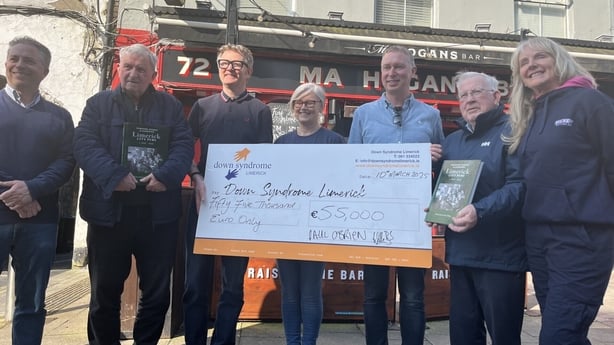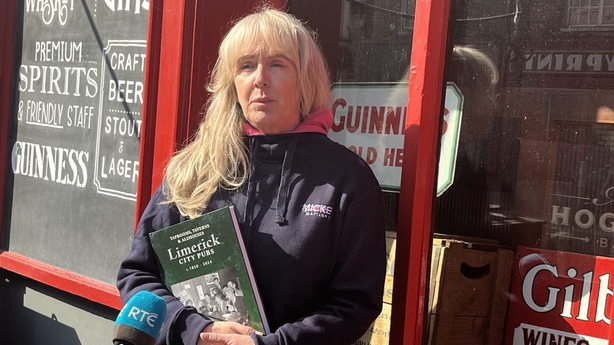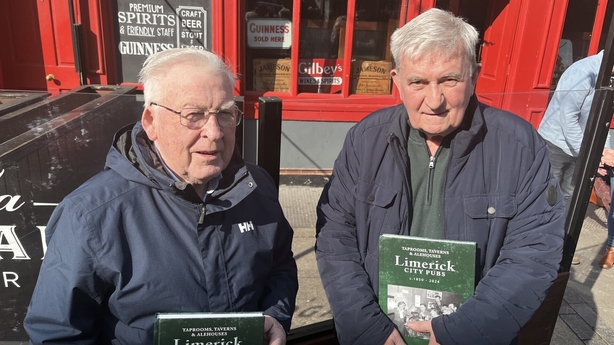The publication of a book on some of the longest established pubs and ale houses in Limerick, many in the same families stretching back two centuries, has raised €55,000 to help expand the services offered by Down Syndrome Limerick.
Down Syndrome Limerick aims to support families and individuals with Down Syndrome through a range of Social, Education and Development activities.
'Limerick City Pubs 1850 - 2024: Taprooms, Taverns and Alehouses' includes the stories and photographs of many of the pubs across Limerick city.
It was written during the Covid-19 pandemic, when causal conversations about missing outings to the pub and their integral role in our social interaction and lives took root.
It became a major research project and eventually a book.
It is written by Dr Paul O’Brien of Mary Immaculate College and fellow author William Banks.

The book details and illustrates accounts of the pub trade going back to the mid 1800’s, including old photographs, order books, invoices as well as oral histories and stories from many of the city’s older bar tenders and owners.
It includes over 500 photographs and research into over 800 pubs, many run by generations of the same families such as the Flannery’s and Martin’s as well as the famous South’s Pub, which featured in the film Angela's Ashes.
Noteworthy during the course of their research was that over 50% of pubs down the decades were owned by women, even though women frequenting public houses was not a feature of the country’s social life at all during the 60’s and 70’s.
It also noted that up to 170 of the 800 pubs illustrated have now closed.

Among those featured in the book is Mickey Martin's Pub in Augustinian Lane that is now owned by Deirdre Martin, but originally owned by her parents Mickey and Diana.
Ms Martin discovered during research of the history of her premises that it had been trading in the same place as a pub since 1819 and was run by a woman, Lucinda Warren.
"I was just fascinated when I delved into the history of the premises and to discover the very important role played by women in the business down the centuries," she said.
"It’s a source of great pride and heritage to both me and now my daughters to find and document that history and the book has done that," she added.
David Hickey is owner of the well-known Souths Pub on Limerick’s O’Connell Avenue and he has served as an active member of the Vintners' Federation of Ireland all his life.
"I’m in the trade all my life and indeed my family before me started out in a small pub in Clonlara in Clare," he said.
"What strikes me is how bars have changed so much over the decades, how sophisticated they have become as social locations, and an important part of people's lives," he added.

However, Mr Hickey said that with "progress comes regulation".
He said: "The pub trade is heavily regulated now and in addition to that, there have been so many pubs which have closed.
"There was a 32% drop in the number pubs in Limerick since 2005."
Another publican Timmy Martin, who runs a pub by the same name in the city’s Sarsfield Street, noted how few women frequented pubs back in the early days of his working life.
"If you saw one or two women coming into the pub that was about the most," he recalled.
"They would just have a half glass of beer, or a glass or sherry. A woman having a pint was unheard of back in the day, but that all changed over the years," he added.
Dr O’Brien said the book really was a trip down memory lane for the city’s pubs and taverns but an important historical record of the city’s pubs, many which are also housed in old historic buildings.
"The stories of the many pubs of Limerick are an important part of the history and identity of our city," he said.
"These are histories that need to be both preserved and celebrated, and it's important that we can keep these fondly remembered places and people alive for future generations."






